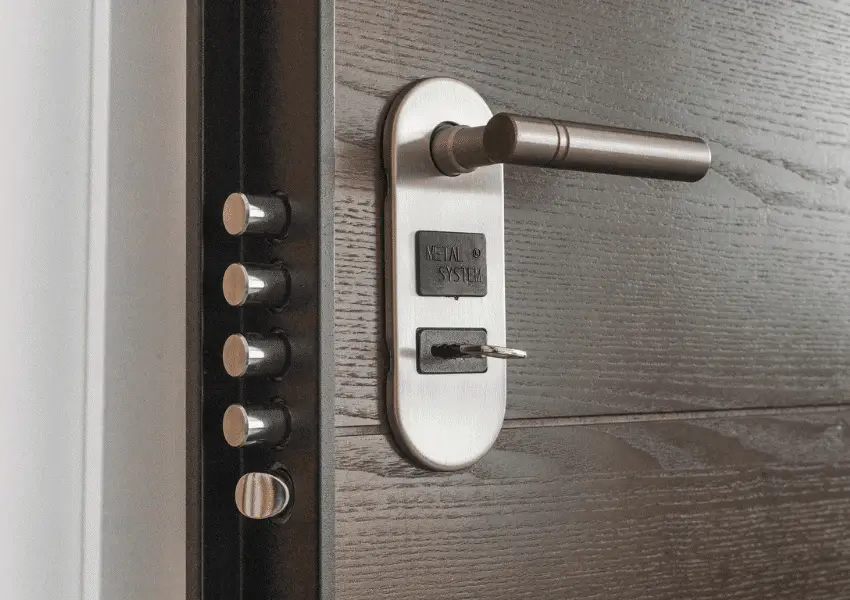If you do your homework first, you speak to your guests, they have good reviews, and you trust your instincts then you’ve got nothing to worry about (probably), and you’ll find 99% of your guests are problem-free. But is that assurance from me enough? Probably not. So instead I’ve brainstormed the ultimate checklist for to you have peace of mind when you’re renting a room in your house.
1. Thinking about the limits of the Airbnb host guarantee
Airbnb widely advertises its Million Dollar host guarantee. (You can see it here). But this is neither the only insurance policy you should have, and you should also realize that it has its own problems and isn’t a foolproof policy.
You will require pretty detailed documentation to make a claim against it, and the process with Airbnb is rather laborious. So don’t count on this as being your “catch-all”.
Specifically, the Airbnb host insurance doesn’t cover:
- Cash or valuables (so if a guest stole money from you this isn’t covered, for example)
- Damage to Pets…..
- Damage caused in communal areas or shared areas
And, therefore if you’re hosting in your home, these are pretty big areas of potential risk.
2. Vet Guests
It makes a lot of sense to vet guests before they stay with you. You will be able to get a good feel for them by how they communicate via the messaging app, but it’s also worth calling them – on the pretext of saying “hello” (if you need a pretext) and having a quick chat about their visit. I’m an amateur psychologist by profession, and know for a fact that you can tell an awful lot about someone by how they speak over the phone: What they say, or perhaps more importantly what they don’t say.
If you’re not comfortable, don’t host them. It’s as simple as that. Airbnb, as I understand it, will allow you to cancel a reservation if you’re not comfortable with a guest, and ultimately, it’s your home, so no one can ever compel you to have someone stay in your house. If in doubt don’t.
Vetting guests is not a complicated process and this will be a massive preventative measure in protecting your home (and its occupants) once you start hosting.
3. Protect Your Home with the Correct Insurance
The vast majority of residential home insurance policies will not cover Airbnb guests. Whilst 99 times out of 100 you won’t need it, there are a few critical things to be aware of:
- If your insurer discovers you are letting a room on Airbnb this could (potentially) invalidate your whole insurance policy. Just think about that for a second: Let’s say your hot water tank leaks (as an example) and floods your entire house causing thousands in damage. If your insurer finds out that you have breached a policy term, they could quite possibly deny your claim.
- Generally, insurers are not known to be keen on paying claims, so give them no excuse to deny a potential claim as it could bankrupt you.
- In the UK, PILK.com is an insurer dedicated to Airbnb hosts as are now4cover.com
4. Fall in Love with Locks!
For one thing, the guests that stay with you will much prefer that they can lock the door to their room in your house. In reality, it’s pretty meaningless because they will know you have a key, but it’s a nice “comfort” factor that at least gives the illusion of privacy.
But more importantly, when it comes to protecting your home, you will have to decide which are the “off-limits” areas and protect them accordingly. When I’ve had guests in my home before, we decided that the 2nd floor (in the UK we refer to the ground floor, 1st floor, and 2nd floor, etc) would be off-limits to guests, and we installed discreet locks on all of the bedroom doors as well as my study.
4. Re-organize Open Areas
If you’re anything like me, you have mail piling up from weeks ago in the kitchen and as it’s your own home, you’re not restricted as to where valuables are kept.
This changes when you host. If there’s any one thing that’s either sentimentally or financially valuable, then move this to the “safe” area of your house. Things get broken by accident, and things get stolen by the dishonest, so do not give people the chance to do this.
It’s also worth keeping in mind the concept of “identity theft” which is an increasing problem in many countries. Paperwork like credit card bills or bank statements could easily lead to this so take great care to remove these types of documents (I shred everything).
This re-organization will not take long, and as an added bonus, it’s a reason to tidy up, which you’ll need to if you’re hosting guests anyway.
5. Buy a safe
Along with locks and a domestic re-org, for really expensive things, buy a safe. If your spouse has a lot of expensive jewelry, this has to be locked up. I would probably say the same about things like laptops and iPads if you’re likely to be away for any length of time.
Amazon has some nice options. We bought this one the Master Lock Fireproof Safe 22.8L as it’s got plenty of room for expensive electrical things as well as jewelry.

6. Consider a camera but be careful
If I was a guest, I must say that I would be pretty off-put if I knew that I would be monitored by CCTV. Airbnb does allow this (see mashable.com article) but you must declare it on your listing, and you mustn’t (obviously) have any CCTV in intimate areas like bedrooms or bathrooms.
So you have two choices. Use a camera and don’t declare it (not advisable). Don’t use cameras at all, or the third – compromise option – (this is what I do) is to have a camera at the entrance of your property so you can at least check who’s coming and going.
7. Wifi Door Locks
Leading nicely on from cameras, definitely a good idea is a Wifi door lock. This means you can give people a code (rather than a key that can be copied) and means you can be alerted to people coming and going. Along with a camera, a “smart lock” can all be monitored from your smartphone, making checkups on your property really easy to do.
Conclusion
I hope you found this article useful. Is there anything I’ve missed or anything you can add? If so, please do leave a comment below. That would be super helpful.
Airbnb hosting in the home is for the very most part problem-free (the problems start when hosts are not on site), and I would encourage everyone who’s interested in doing this to try it out, and it’s unlikely you will have problems, but only if you take some or all of the preemptive measures I’ve referred to hear.
To your hosting success,
Best Wishes,
Tony

